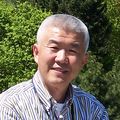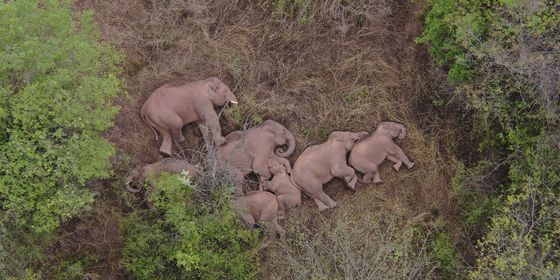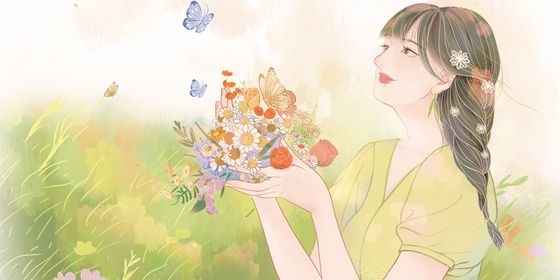A character to brighten up your day—or night
In the midst of the “dog days” of summer, Chinese netizens like to jokingly express gratitude to two figures from history: Willis Carrier, inventor of the modern air-conditioning unit, and mythological archer Hou Yi (后羿). According to legend, there used to be 10 suns in the sky, but Hou Yi shot down nine of them to protect the planet’s inhabitants from burning to a cinder.
In Chinese, the characters 日(rì) and 阳 (yáng) both represent the sun. The oracle bone script of the character 阳 developed over 3,000 years ago, and consisted of a “mountain” radical, 阜 (fù), on the left, and a representation of the rising sun, or 日, on the right. Its original meaning was “the side of a mountain exposed to the sun.”
In ancient Chinese philosophy, yang (阳) and yin (阴) are the opposite principles or forces co-existing in nature and human affairs. Pairs like the sun and moon, life and death, and male and female can all be represented by yin and yang. The 阳历 (yánglì, solar calendar, or Gregorian calendar) was developed based on the rotation of the Earth around the sun, while the traditional 阴历 (yīnlì, lunar calendar) in China corresponded to the moon’s orbit around the globe; 阳间 (yángjiān) refers to the world of flesh (or what we would call “reality”), while 阴间 (yīnjiān) refers to the spirit world, including the afterlife.
According to Traditional Chinese Medicine, upsetting the balance of these opposing natures, or 阴阳失调 (yīnyáng shītiáo), is the root of most illnesses in the human body. Even in modern medicine, the Chinese word for a negative test results is 阴性 (yīnxìng, yin-type), while a positive result is called 阳性 (yángxìng, yang-type). For example: 他的病毒检测结果为阴性。(Tā de bìngdú jiǎncè jiéguǒ wéi yīnxìng. “He tested negative for the virus.”)
Generally, as indicated by most yin and yang related expressions, 阳 represents the positive or bright side, whereas 阴 is negative and dark. For example, a conspiracy or underhand scheme is called a 阴谋 (yīnmóu). Other terms involving 阴, such as 阴暗 (yīn’àn, dim, dark), 阴沉 (yīnchén, overcast, gloomy), 阴毒 (yīndú, treacherous and vicious), and 阴狠 (yīnhěn, sly and vicious) describe a host of undesirable traits.
Where gender is concerned, 阳 is the character traditionally associated with men, and 阴 with women: 阳刚 (yánggāng) describes traditional masculine qualities (strong and tough), whereas 阴柔 (yīnróu) refers to feminine ones (gentle and soft). Typical ancient attitudes about gender differences—many of which remain in place today—were reflected in the “Family Precepts to Descendants” (《训子孙文》), an essay by Chinese historian, writer, and politician Sima Guang (司马光) of the Northern Song dynasty (960 – 1127): “The husband is the sky, the sun, and yang; the wife is the Earth, the moon, and yin.”
The phrase 太阳 (tàiyáng) refers to the sun. More specifically, 朝阳 (zhāoyáng) is the rising sun and 夕阳 (xīyáng) the setting sun. These terms can also serve as adjectives such as 朝阳产业 (zhāoyáng chǎnyè, emerging industries) and 夕阳产业 (xīyáng chǎnyè, declining industries). To express regret for all life’s ephemera, you can quote a line from poet Li Shangyin (李商隐) of the late Tang dynasty (618 – 907)—夕阳无限好,只是近黄昏 (Xīyáng wúxiàn hǎo, zhǐ shì jìn huánghūn), meaning “The setting sun is unrivaled in splendor; pity that the dusk fast approaches.”)
The phrase for sunshine is 阳光 (yángguāng), the source of 太阳能 (tàiyángnéng, solar energy). For a trip to the beach on a sunny day, you may need to protect yourself with gear such as 太阳镜 (tàiyángjìng, sunglasses) and 太阳伞 (tàiyángsǎn, parasol).
The character 阳 can be used to describe other warm, bright, or powerful subjects: 阳春 (yángchūn) is a warm spring, and 阳光少年 (yángguāng shàonián) are energetic youths. 阳关大道 (yángguān dàdào), originally referring to the ancient Yangguan Pass along the ancient Silk Road in Dunhuang, Gansu province, has evolved to mean a metaphorical road to prosperity. If two collaborators do not see eye-to-eye on any matter, they may dissolve the partnership by saying, 你走你的阳关道,我走我的独木桥 (Nǐ zǒu nǐ de yángguāndào, wǒ zǒu wǒ de dúmùqiáo. “You take the wide and easy road; I will cross the narrow log bridge.”)
Due to their opposition, 阴 and 阳 appear together in expressions related to unexpected or troubled topics. For example, 阴差阳错 (yīnchā yángcuò, yin and yang are mismatched), refers to mistakes arising from a strange combinations of circumstances. A person who is eccentric or abnormal is called 阴阳怪气 (yīnyáng guàiqì, yin and yang are strange).
There is even an idiom 阴盛阳衰 (yīnshèng yángshuāi, yin rises, yang falls) for a situation where women outperform men (but not the other way around), such as the recent gaokao results. Traditionalists in China are always concerned that men will be emasculated by highly educated and high-achieving women. They ought to remember, though, that as in the yin–yang symbol, the two seemingly contrary forces actually complementary and interdependent in the natural world. A healthy physique, a truly balanced society, and a prosperous country are all the product of yin and yang equally.
On the Character: 阳 is a story from our issue, “The Masculinity Issue.” To read the entire issue, become a subscriber and receive the full magazine. Alternatively, you can purchase the digital version from the App Store.















